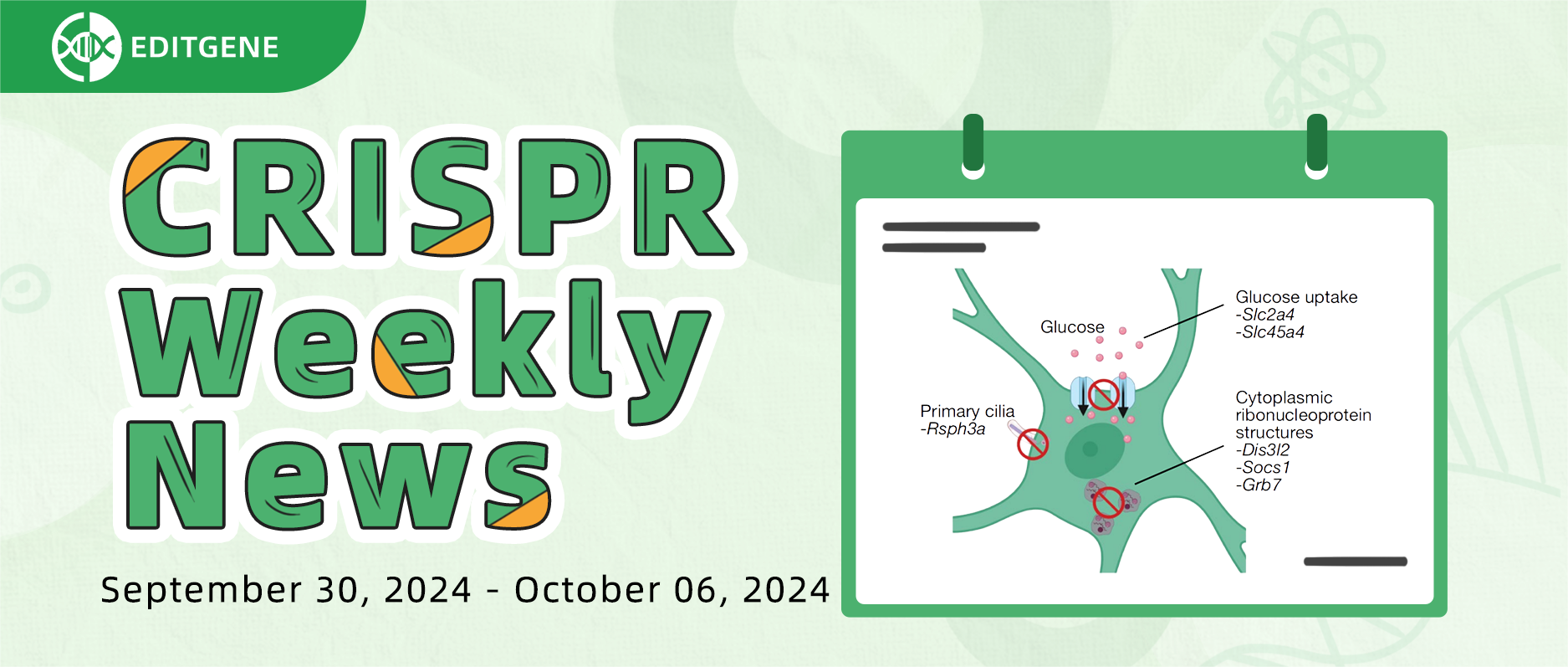[Weekly News] Fight Aging! CRISPR/Cas9 Reveals New Role of Glucose Metabolism in Cellular Senescence

CRISPR/Cas technology is a revolutionary tool in modern bioscience, with applications expanding into medicine, agriculture, ecological conservation, and more. The "CRISPR Weekly News" section brings you the latest research and industry news. Below is a brief summary of last week's top headlines:
I. Research Updates
i. CRISPR Screening
1. Title: CRISPR–Cas9 screens reveal regulators of ageing in neural stem cells
Journal: Nature (Impact Factor: 50.5)
Original Link: https://doi.org/10.1038/s41586-024-07972-2
Aging impairs neural stem cell activity in the adult mammalian brain. Researchers conducted a genome-wide CRISPR screen on primary neural stem cells from young and aged mice, identifying over 300 genes whose knockout specifically restored the activity of aged neural stem cells. The study highlighted glucose metabolism as a key factor in this process, with Slc2a4 (encoding GLUT4 glucose transporter) knockout showing the most significant results. This research offers a platform to systematically identify genetic interventions that enhance aged neural stem cell function, providing important insights for combating regenerative decline during aging.
2. Title: A genome-wide CRISPR/Cas9 knockout screen identifies SEMA3F gene for resistance to cyclin-dependent kinase 4 and 6 inhibitors in breast cancer
Journal: SpringerLink (Impact Factor: 4.0)
Original Link: https://doi.org/10.1007/s12282-024-01641-y
Researchers used CRISPR/Cas9 genome editing to perform a whole-genome knockout screen on the MCF7 breast cancer cell line to identify resistance genes to the CDK4/6 inhibitor, palbociclib. The study revealed that SEMA3F plays a key role in breast cancer sensitivity to CDK4/6 inhibitors, marking it as a potential therapeutic target.
ii. CRISPR Knockout Cell Lines
1. Title: Cytosolic nucleic acid sensors and interferon beta-1 activation drive radiation-induced anti-tumour immune effects in human pancreatic cancer cells
Journal: Frontiers in Immunology (Impact Factor: 5.7)
Original Link: https://doi.org/10.3389/fimmu.2024.1286942
Researchers explored immune responses in pancreatic cancer cells following radiation therapy. Using CRISPR/Cas9 knockout and inhibitors to examine STING, MAVS, and NF-kB pathways, they demonstrated that radiation-induced immune responses in pancreatic cancer cells were regulated by these key pathways, highlighting the potential for combining radiotherapy with immune modulation to develop new treatments for pancreatic ductal adenocarcinoma (PDAC).
2. Title: The critical role of Gαi3 in oral squamous cell carcinoma cell growth
Journal: Cell Death Discovery (Impact Factor: 6.1)
Original Link: https://doi.org/10.1038/s41420-024-02191-0
Gαi3 was identified as a crucial factor in the growth of oral squamous cell carcinoma (OSCC) cells. Researchers found that Gαi3 knockout, achieved using CRISPR/Cas9, significantly inhibited cell proliferation and migration while inducing apoptosis in OSCC cells. This suggests Gαi3 as a potential target for OSCC therapy.
iii. CRISPR Detection
1. Title: CRISPR/Cas-mediated "one to more" lighting-up nucleic acid detection using aggregation-induced emission luminogens
Journal: Nature Communications (Impact Factor: 14.7)
Original Link: https://doi.org/10.1038/s41467-024-52931-0
Chinese researchers introduced CrisprAIE, a CRISPR-based diagnostic system using aggregation-induced emission luminogens (AIEgens) to improve CRISPR detection sensitivity. The system increased detection sensitivity by 270 times, allowing rapid, amplification-free detection of viruses like SARS-CoV-2.
2. Title: Split crRNA with CRISPR-Cas12a enabling highly sensitive and multiplexed detection of RNA and DNA
Journal: Nature Communications (Impact Factor: 14.7)
Original Link: https://doi.org/10.1038/s41467-024-52691-x
The split Cas12a system (SCas12a) enables highly sensitive, multiplexed detection of RNA and DNA without amplification. Researchers demonstrated its ability to quantify miR-21 biomarkers in cervical cancer patient plasma and detect HPV in clinical samples, providing a simple and cost-effective diagnostic platform for various settings.
iv. Other CRISPR-Related Research
1. Title: Extended pegRNAs enhance the editing capability of Prime editing
Journal: Trends in Biotechnology (Impact Factor: 14.3)
Original Link: https://doi.org/10.1016/j.tibtech.2024.09.004
Researchers developed extended Prime Editing (exPE) technology to address the limitations of traditional Prime Editing (PE). This new method significantly improves editing efficiency, particularly in regions with poly-T sequences, and has the potential to correct nearly 90% of human genetic mutations, broadening its application in genetic research and therapy.
2. Title: AAV vector-derived elements integrate into Cas9-generated double strand breaks and disrupt gene transcription
Journal: Molecular Therapy (Impact Factor: 12.1)
Original Link: https://doi.org/10.1016/j.ymthe.2024.09.032
Researchers evaluated the performance of various AAV vectors in delivering CRISPR-Cas9 for gene therapy. The study highlighted the importance of vector elements and the number of target sites in gene editing outcomes, particularly for treating conditions like Angelman syndrome.
3. Title: Epitope prime editing shields hematopoietic cells from CD123 immunotherapy for acute myeloid leukemia
Journal: Cell Stem Cell (Impact Factor: 19.8)
Original Link: https://doi.org/10.1016/j.stem.2024.09.003
Acute myeloid leukemia (AML) is characterized by abnormal differentiation of hematopoietic stem and progenitor cells (HSPCs). While CAR-T cell therapies target AML cells, they often induce severe off-target toxicity by attacking normal cells expressing the same antigens. In this study, researchers used base editing (BE) and Prime Editing (PE) technologies to modify the CD123 epitope on HSPCs, protecting healthy cells from CAR-T-induced cytotoxicity while maintaining their normal function. The study demonstrated that epitope-modified cells were resistant to CAR-T cell lysis, providing a proof-of-concept strategy for treating relapsed AML.
II. Industry News
1. ERS Genomics Limited signed a CRISPR/Cas9 licensing agreement with Université de Montréal (UdeM) to launch two CRISPR screening platforms at UdeM's Immunology and Cancer Research Institute. This agreement aims to expand access to whole-genome CRISPR screening, identifying new therapeutic targets.
2. Precision BioSciences has submitted a clinical trial application (CTA) to initiate a Phase 1 study evaluating PBGENE-HBV, an in vivo gene editing program targeting chronic hepatitis B. The therapy aims to eliminate cccDNA while inactivating integrated HBV DNA in liver cells, potentially curing chronic HBV.
3. Prime Medicine announced a strategic research collaboration with Bristol-Myers Squibb to develop reagents for next-generation T cell therapies. Prime Medicine will design optimized Prime Editors, while Bristol-Myers Squibb will handle the development and commercialization of the cell therapies.
EDITGENE focuses on CRISPR technology, offering a range of high-quality gene editing services and in vitro diagnostic products.
These include but are not limited to: CRISPR Library Screening, Cell Line Engineering, Monoclonal Cell Line Screening, CRISPR Detection.
We are committed to providing the most efficient technical services for CRISPR-related, gene function research, in vitro diagnostics, and therapeutic research.
Recent Blogs:
Follow us on social media
Contact us
+ 833-226-3234 (USA Toll-free)
+1-224-345-1927 (USA)
info@editxor.com






